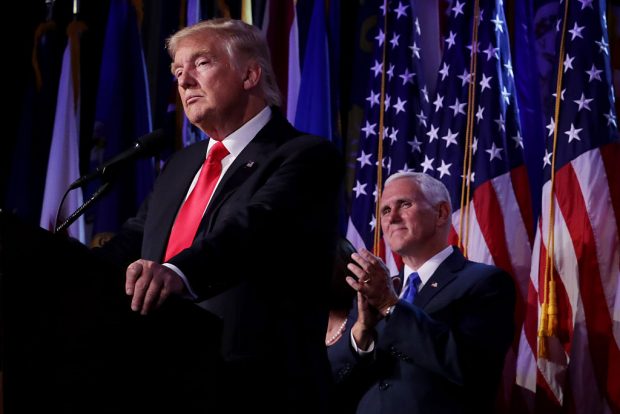On election day, I left my apartment on the east side of Manhattan, walked one block to my polling station, and got in line. A reporter from the neighbourhood paper was asking people who they were voting for and why. The woman ahead of me said she was voting for Clinton, both to stop Trump and because she wanted to see a woman finally break the glass ceiling. The little boy strapped to her chest kept waving at me over her shoulder. I waved back. Well, instead of breaking a glass ceiling, we’ll be building a wall.
The difference is telling. In her concession speech, Clinton said her goal had been ‘breaking down all the barriers that hold any American back from achieving their dreams‘. This is the dream of liberalism, which seeks freedom from any social or economic constraint. Elites like Clinton feel confident that they can navigate a deregulated society in which class, gender, and race are all fluid. They support deregulated markets as well, confident that free trade and open borders will serve their own interests in the near term and the whole country’s in the longer term.
The rest of America isn’t so sure. The people who put Trump into office want security and solidarity, not creative destruction. They look askance at the Trans-Pacific Partnership and transgender rights. They do not want broken barriers and shattered ceilings, they want four walls of adobe slats and a roof over their heads.
In mild and radical ways, people across the world are turning away from a liberal belief in open borders, open markets, and the ability of formal procedures to ward off debate over fundamental questions. We can see this in the choice of British citizens to vote for Brexit; in the fact that France’s leading presidential candidate is Marine Le Pen. In Austria, the anti-immigrant Freedom Party has entered the run-off for the presidential race. In Hungary, Viktor Orban has moved the country toward Christian nationalism and an alliance with Russia. The Law and Justice party, socially conservative and economically interventionist, has moved Poland away from the liberal consensus of free-market secularity.
Liberalism has fared no better in the middle east. Arab nationalism sought to set aside questions of religion and create an order that could be based solely on shared ethnicity and legal norms. Now, democratic nationalism has given way to Islamic extremism. The green revolution withered, and the Arab spring has turned into an Islamist summer. The most costly attempt to establish liberal order in the Middle East—the invasion of Iraq—has also been the most disastrous.
Six days after missiles hit Baghdad, Tony Blair wrote a memo to George W. Bush about their ‘fundamental goal’:
This is the moment when you can define international politics for the next generation: the true post-cold war world order. Our ambition is big: to construct a global agenda around which we can unite the world; rather than dividing it into rival centres of power. So our fundamental goal is to spread our values of freedom, democracy, tolerance and the rule of law, but we need a broad based agenda capable of unifying the world, to get it.
Bush and Blair hoped to build a new world order based on liberal freedom. Clinton shared this ideal, but Trump flatly rejected it. His election, following the success of Brexit, shows that the new world order has been repudiated not only in the Middle East but in the two countries that were supposed to promote it. Florian Philippot, a strategist for Marine Le Pen, understands the stakes. After news of Trump’s election, he tweeted, ‘Their world is collapsing. Ours is being built.’
Joseph II, ruler of the Holy Roman Empire in the late eighteenth century, sought to make the traditional society he ruled more liberal through a revolution from above. ‘Everything for the people, nothing by the people’ was his motto. American leaders adopted their own form of ‘Josephinism’, believing that common people should gain their mores, like their money, through the trickle-down effect.
That plan has now been rejected, and America’s supposed leaders are reeling with incomprehension, dismissing anyone who dared defy them as a cretin. I see this in my own neighbourhood. We New Yorkers are bigoted and ignorant enough to think that people elsewhere must be more bigoted and ignorant than we are. Like Herodotus, we think that people who live in different places and believe different things might be monsters, ‘dog-headed and headless men that have their eyes in their chests.’
Trump’s supporters are not immune to racism, sexism, or any of the many –isms (and their candidate is far too prone to them), but to reduce their vote to a mere expression of animus is to miss the point. Voters sense the need for a deeper solidarity and a higher order than liberalism can give them. They don’t want to shatter ceilings if it means they have no roof in a storm. Trump offers protection to some Americans but leaves others out in the cold. Who will articulate a politics that is hospitable to all?
Matthew Schmitz is literary editor of First Things.

 After the American people have voted, what next for the US and the rest of the world? Join panellists including Sir Christopher Meyer, KCMG, former British ambassador to the US, for a discussion chaired by Andrew Neil on 30 November at RIBA, London. Tickets include a drinks reception. In association with Seven Investment Management. Book now.
After the American people have voted, what next for the US and the rest of the world? Join panellists including Sir Christopher Meyer, KCMG, former British ambassador to the US, for a discussion chaired by Andrew Neil on 30 November at RIBA, London. Tickets include a drinks reception. In association with Seven Investment Management. Book now.






Comments